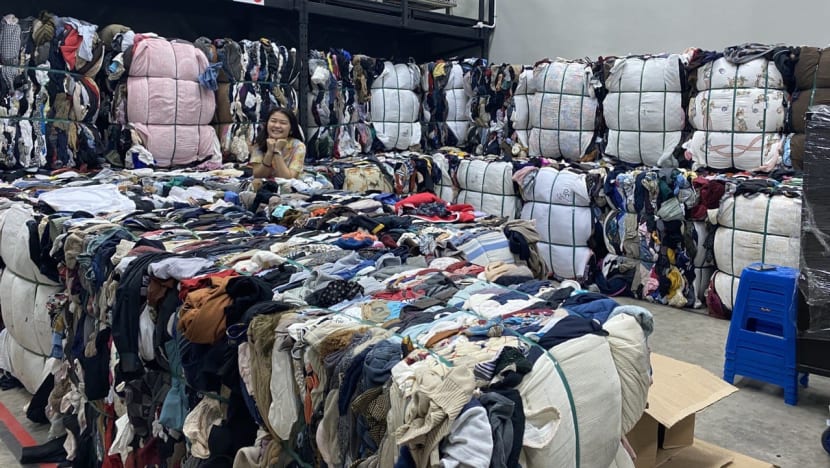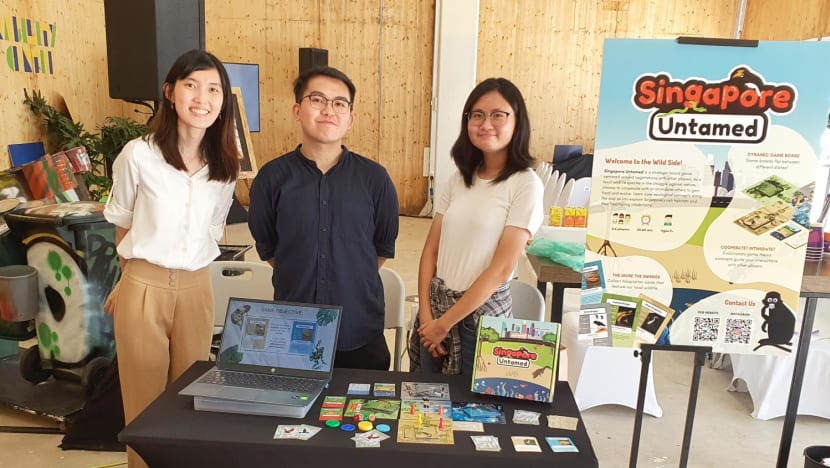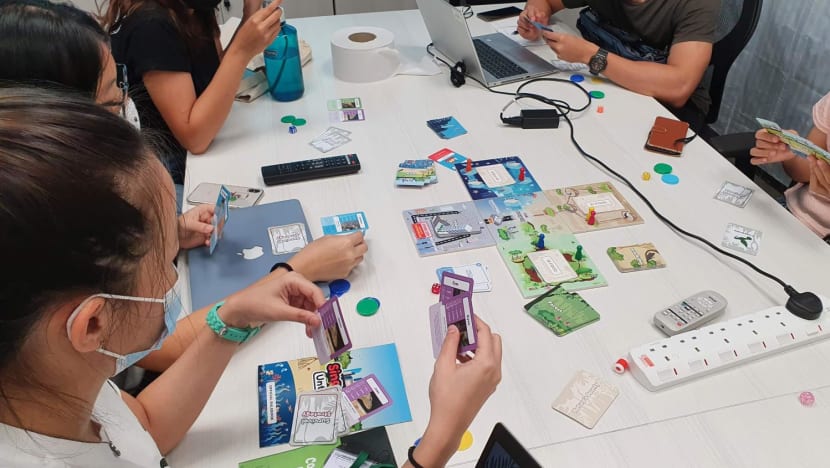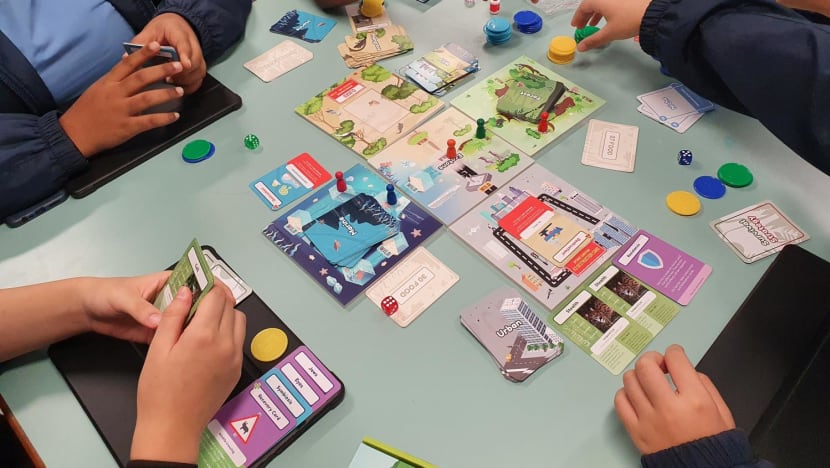Thrifting clothes and board games: How two fresh graduates in Singapore are trying to save the Earth
From saving 8,000kg of old clothes to inventing a board game, two university graduates in Singapore saw something they could do to help the environment and went ahead and did it.

Co-founder of The Tryft Shop Cheow Sue-Jane with bales of unwanted clothes from Japan. (Photo: Cheow Sue-Jane)
SINGAPORE: When fresh graduate Cheow Sue-Jane heard about 8,000kg of clothes that were to be thrown away in Japan, she decided to do something about it.
“It coincidentally happened during a period of time that I was still figuring out what I wanted to do in life,” the 23-year-old told CNA.
This was in 2021 and she had just finished an internship at the end of her third year of university.
“There was nothing really going on in school. So I was like, okay, let’s use this opportunity to start something since it aligned with my passion about sustainability and community work.”
Ms Cheow decided to invest about S$20,000 to buy the 40 bales of old clothing and rent a warehouse for it. Now, she runs The Tryft Shop with her family, alongside her full-time job at a furniture brand.
She and her family started sifting through the 8,000kg of clothes and sold some through their Instagram account and at pop-up stores. They also worked with beneficiaries like homeless shelters to supply clothes for those in need.
For clothes that were not wearable or damaged, Ms Cheow worked with local designers or costume production teams who used the materials to rework them into new clothes.
“In that way, we try to reduce our waste. That’s our operations so far, and the idea that has taken form.”
Her father, who is in the paper and plastics recycling industry and works with recycling suppliers in Japan, had told her about the clothes, knowing that Ms Cheow and her older sister were passionate about clothes and sustainability.
When the clothes arrived, she was shocked at the sheer volume, she told CNA.
“I think I was overly optimistic, because when the shipment came in the container ... it was really quite overwhelming.”
BREAKING EVEN
Ms Cheow has always been active in the environmental scene, participating in coastal cleanups and other projects. She has also been thrifting for clothes with her sister since their secondary school days.
“When we first started, it was the time when there were a lot of shipment and vessel issues. We also had to wait a long time and we had an empty warehouse for two months. At the start it was very rocky, and a lot of people were saying how it was not a very good time to start a business during COVID.
“But I think we’ve just been very lucky that there are a lot of people who are starting to be passionate about sustainability, and that’s why we’re still alive.”
The team still has about half of the 8,000kg of clothes to sift through. Ms Cheow, who graduated with a degree in arts and social sciences majoring in psychology from the National University of Singapore last July, said the business has almost reached its break-even point.
The brand celebrated its first anniversary in September.
“My goal is a very humble goal – I just want to be able to continue to do this more sustainably. To meet people that are like-minded, that want to come and thrift, to work with people who want to rework (the clothes) ... because that’s really how you cut down on waste.”
While having a physical shop would be “great”, the idea is not so feasible for now as it would be too financially taxing on the business to have both a physical storefront and a warehouse, she said.
With a full-time job, finding time to manage her startup is also difficult, Ms Cheow said.
She spends most of her day at work, and heads to the warehouse after work two to three times a week to meet partners who are keen to work with the brand, organise events and sift through the remaining clothes.
“My company is really very supportive, but overall it’s been difficult juggling both … I would say it’s challenging but not impossible. It’s just a bit more tiring but it’s still doable,” she said.
LIVING SUSTAINABLY AND CONSUMING LESS
When asked how she encourages the people around her to live more sustainably, she stressed that even a little bit goes a long way.
“I always emphasise that you don’t have to be 100 per cent a sustainability queen, you don’t have to generate zero waste your whole life. Just doing a little bit like just 20 per cent, 30 per cent – that’s still better than nothing.”
A stint at non-governmental organisation Zero Waste SG also taught her how companies hide information about how sustainable their clothes really are.
For example, companies may say on the tag that the clothes are made of 90 per cent recycled material, but they could be referring to only a specific part of the item, making the item sound better than it actually is, she said.
“I think that was when I was most preachy," she said with a laugh. "But over time, I realised that when you shove it down people’s throats, people don’t take to it very well.
When talking to people about sustainability, her aim now is to "just get them interested", and not to make them feel like they're not doing enough.
When she accompanies friends to fast fashion outlets, she takes the opportunity to offer up similar secondhand pieces from her shop to encourage them to consume less.
“I’ll be like ‘Oh I have something similar, do you want it instead, I can give it to you for free.’ I’d rather rehome (the clothes) and just make sure there isn't more waste generated or that they’re not consuming new products.”

CONTRIBUTING TO WILDLIFE BEST PRACTICES
Also making a difference with her passion for the environment is Alexis Goh, who graduated with a Bachelor's in Science (Environmental Earth Systems Science), with a specialisation in ecology, from the Nanyang Technological University (NTU) last year.
Her interest in biodiversity and nature started after her A-Levels, when she took on a temporary position at the National Parks Board organising outreach activities for the public.
The stint was a "life-changing" experience, she said, and convinced her to apply to study environmental science at university.
As part of EarthLink in NTU, which covers sustainability and environmental activities and projects in the university, she was a nature guide who organised events in different parks in Singapore, introducing them to biodiversity and wildlife.
She and her team launched the NTU BioBlitz programme, where 17 committee members and 21 student volunteers went around the university campus and recorded the wildlife they saw.
In two weeks, they found more than 150 species within the NTU campus. They even spotted the migratory common kingfisher, which is only found in Singapore during certain parts of the year.
“In my experience, when people see this species in the Botanic Gardens, there’ll be one whole crowd of photographers trying to get that shot. But it was just right here, in NTU, in the garden."
Collecting the data itself was rewarding, she added, and seeing the diversity of the wildlife on campus was “amazing”.
But her team didn’t stop there. After collecting the data on campus wildlife, the EarthLink committee spoke to the university management to improve their response to wildlife encounters on campus.
EarthLink has also mapped out where traffic accidents involving animals have occurred on campus, to figure out how they can focus their efforts.
“People saw snakes on campus and they didn't know what to do. From our observations, we weren’t sure if the staff being called in was actually equipped to handle it,” she said, adding that they advised the school on which organisations or contractors to call for help.
“I think that was something really cool that we managed to do because we were able to influence campus protocols to better protect our wildlife.”
After the event, they turned the Telegram group they started for volunteers into a public group, which now has more than 600 members.
“People in the group generally are very open to sharing their sightings on campus. It also helps with our monitoring,” Ms Goh said. “Someone will be like ‘I saw this bird at Hall 3. Do you know what it is?’ And when we look at the picture it’s actually a super rare bird, then we rush down to document it.”
EDUCATING THE PUBLIC
Ms Goh also kickstarted projects to educate the public about biodiversity and wildlife in Singapore.
In the thick of the COVID-19 pandemic in 2020, she took an ecology module, where she was assigned a project to create a solution to teach others about how different species in the environment compete for resources.
Ms Goh and her team-mates’ response was to come up with a game that was "quite a success" in class – which the team eventually developed into a board game.
They sought and received government grants to design, print and launch 50 copies of the board game, named Singapore Untamed.
The game focuses on local biodiversity, with cards featuring species common to Singapore like the oriental hornbill or crabs found in mangrove areas around the island.


Various organisations, secondary schools and polytechnics have since approached them to host the game at their locations.
The team received requests for at least 100 to 200 more copies of the board game to be produced, Ms Goh said.
“My team member was on the MRT on the way home from one of these trial sessions and she was holding the box in her hand. A passenger actually approached her and asked if they could buy it, based on the box design.”
As someone who played many board games growing up, Ms Goh said she is “really happy” to create her own, especially one on a topic she’s passionate about.
She started working as a scientific officer at the Lee Kong Chian Natural History Museum last July and has been juggling her full-time job with her projects.
She encouraged students who are still in school and passionate about the environment to look for opportunities to propose their own initiatives.
“These provide relatively safe and supportive platforms to actually work on these ideas, if you have any, and you should be able to get some kind of funding and support to execute them,” she added.
“But otherwise, for those who may not be in school, there are a lot of programmes and opportunities available to the public as well.”
She also urged those who are interested to take part in “entry-level” public programmes with NParks, where they can learn more about nature and contribute their volunteer efforts.
“The sustainability movement is one where … you don’t have to be a perfect environmentalist, I always tell myself that. You don’t have to fully convert to veganism, switch out plastics in your life.
“It’s important to just take the small steps that you can, because those small steps still contribute to a greater whole.”
Read this story in Bahasa Melayu here.


















